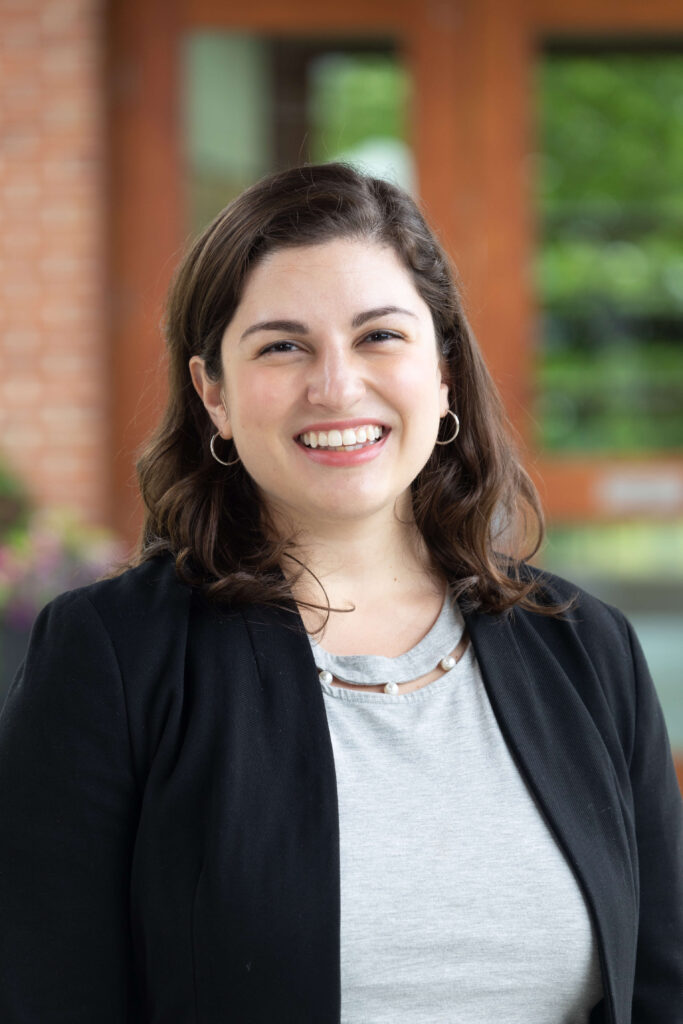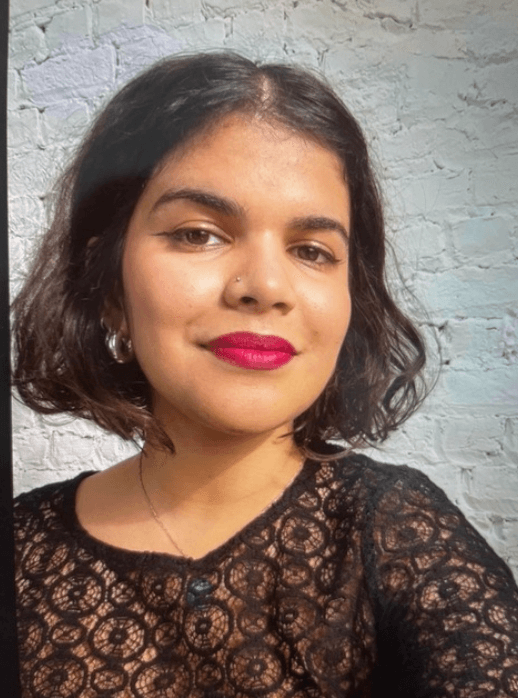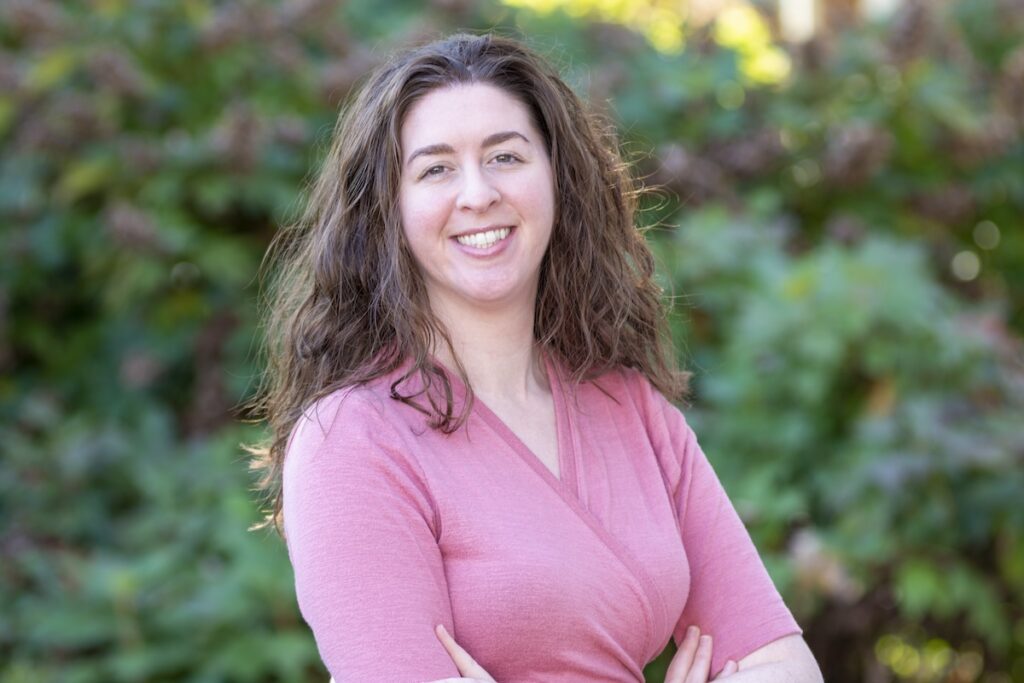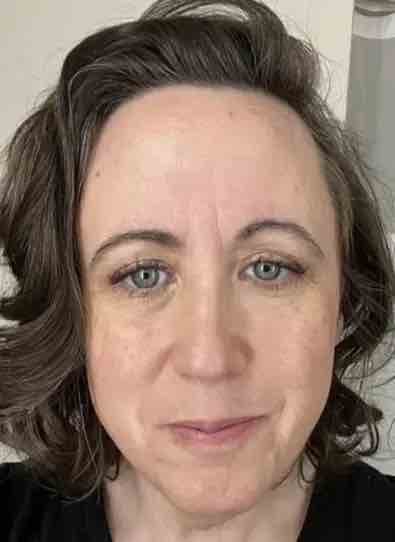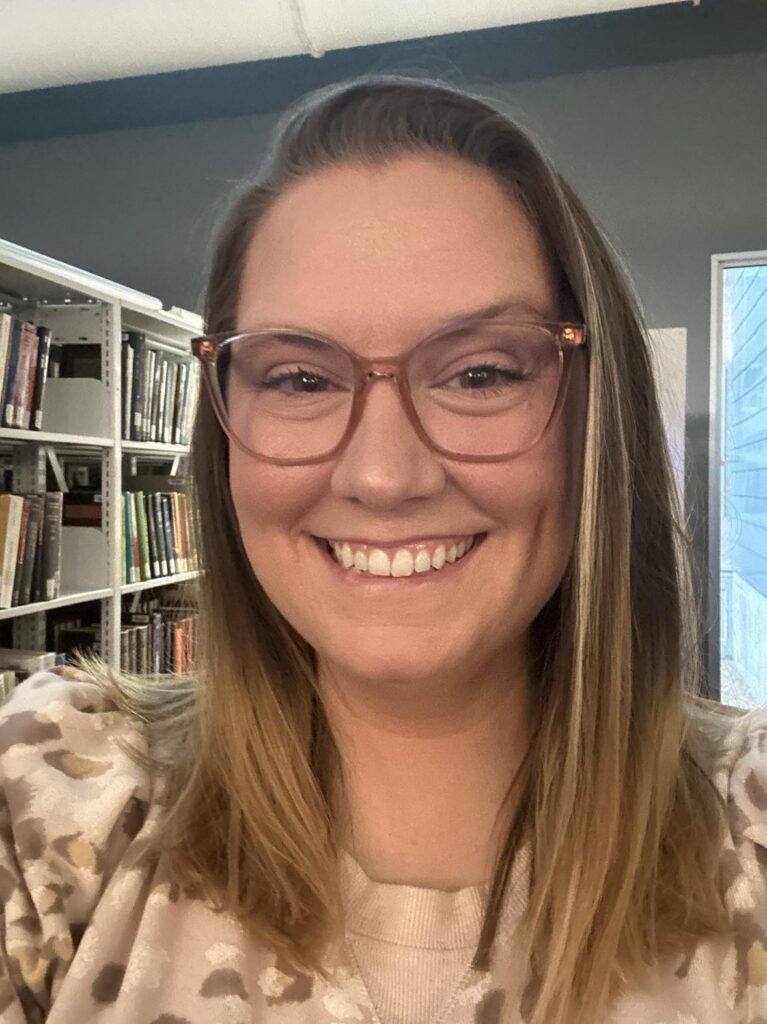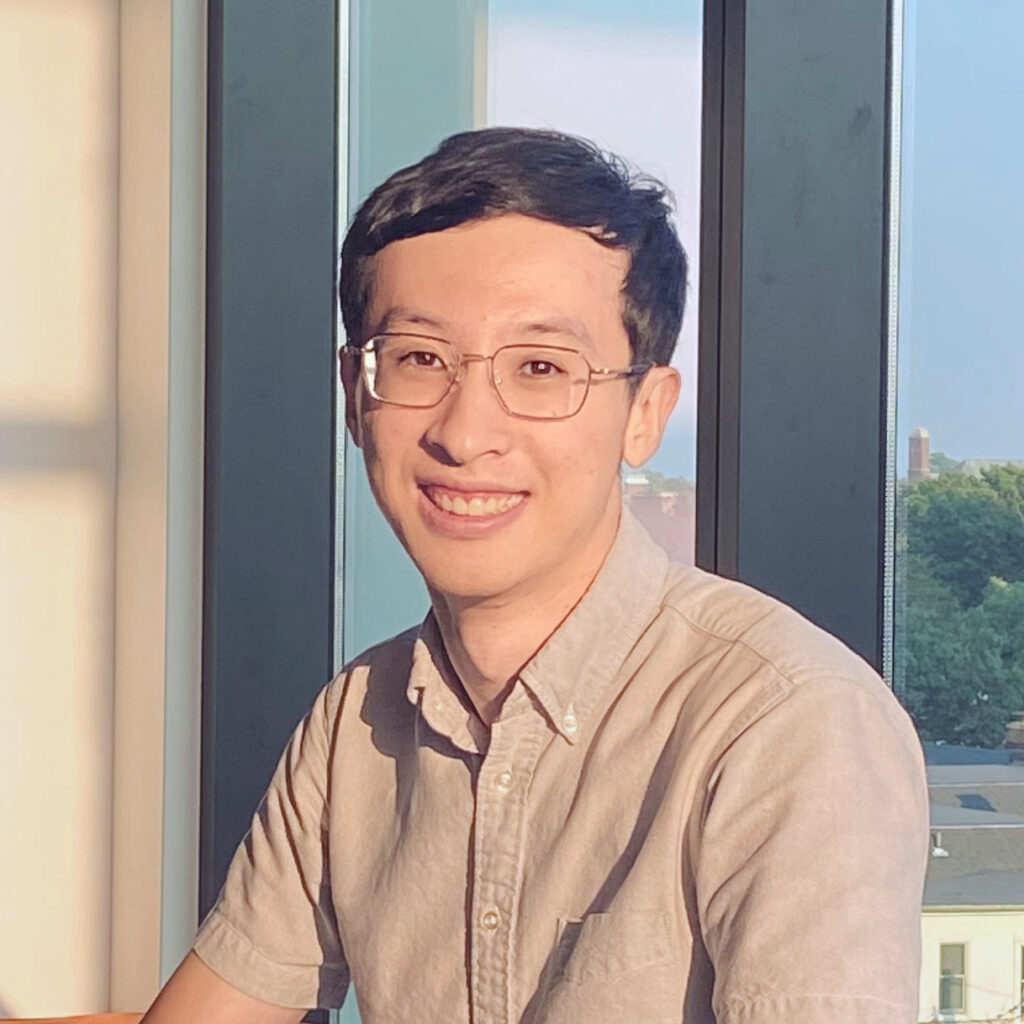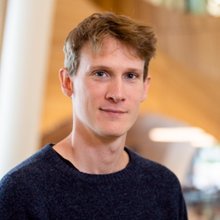Vice President/President Elect
1. Liz Grumbach and Pamella Lach (co-Vice President/President Elect team)
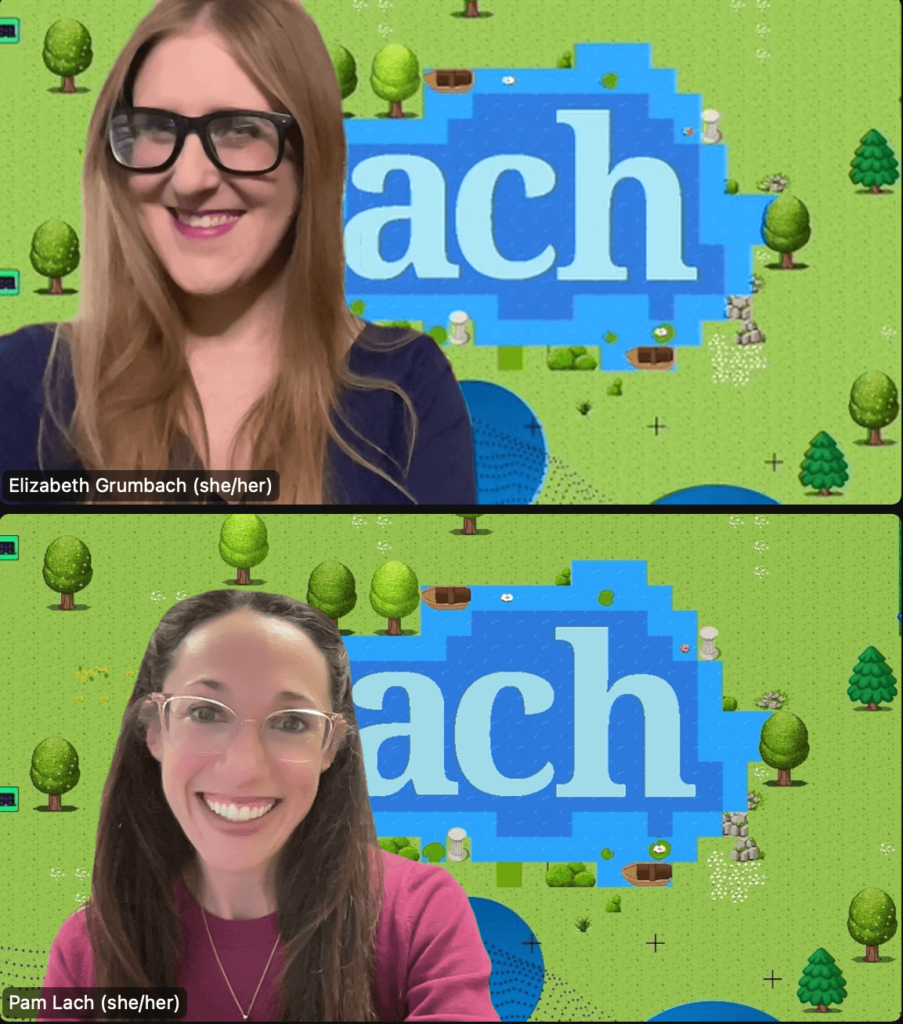
Bios: Liz Grumbach (she/her/hers) is the Director of Digital Humanities and Research in the Lincoln Center for Applied Ethics at Arizona State University, occupying the ancestral territories of the O’Odham and Piipaash peoples. At ASU Lincoln, an organization committed to exploring participatory strategies for ethical technological innovation, she develops collaborative initiatives, projects, and programs at the intersection of DH and Critical Technology Studies. She has been an alt-ac laborer since 2012. As a member of the ACH Executive Council, she is currently ACH2024 Technical Chair, served as the ACH2023 Program Chair, and contributes to ACH professional development initiatives.
Pamella Lach (she/her/hers) is the Digital Humanities Librarian at San Diego State University, occupying unceded Kumeyaay land. She directs the Library’s DH Center and co-directs SDSU’s DH Initiative, a values-oriented network of scholars, teachers, and learners focused on critical digital inquiry. Pam’s work is grounded in care and community, ethical applications of technology, and process-oriented experimentation and pedagogy. Pam leads a weeklong podcasting institute with the National Humanities Center, training 550+ participants in digital storytelling since 2019. As a member of the ACH Executive Council, she served as the ACH2023 Conference Chair and is currently Co-Chair for ACH2024.
Statement: As ACH Co-Presidents, we would continue the intentional work of making ACH an ever-more welcoming and inclusive professional space for all members. We seek to build on current efforts to organize our work equitably around critical issues, including accessibility, anti-oppressive praxis, and labor activism. We are committed to ensuring a space where all members can be seen and feel heard, especially contingent scholars, alt-ac workers, graduate students, and those who are precariously and/or under-employed. We would bring our collective experiences and strengths in ethical project management and community nurturing to our work, seeking to model a trust-based, compassionate, generative, relational partnership in our approach to co-leading ACH. We believe ACH is poised to make transformative change in higher education, and we seek to continue ACH’s current visionary trajectory by committing to justice-oriented, care-based futures for digital humanities.
2. Richa Mishra
Bio: I am a university professor of a private premier university situated at the western region of India. I am currently serving as the Head of the Department of Humanities and Social Sciences and Chairperson of the Board of Studies, Humanities and Social Sciences, at the Institute of Technology, Nirma University, Ahmadabad, Gujarat, India. I was always at the cusp of humanities and technology. As a chairperson of humanities board I will be offering Minor in DH for Engineers as course of 24 credits to my engineering students from July 2024 onwards. As a Project Director and Principal Investigator, I have led significant research projects, including a major Digital Humanities research grant funded by the ICSSR. These projects not only highlight my leadership skills but also my ability to foster interdisciplinary research that spans regions, cultures, languages, and technologies. My work was recognized by the DHoX 22 at Oxford University (second prixe), focused on the study of gendered language in digital political reporting in India.
Statement: As a council member I aim to: 1. Foster Interdisciplinary Collaboration, 2. Promote Diversity and Inclusion, 3. Visibility, and Presence of Digital Humanities in India, 4. Accelerate Digital Humanities Education in India. I bring to ACH a wealth of experience from my involvement with various professional bodies, and a proven track record of leadership in academic and research settings in an engineering school. My contributions to international conferences, workshops, and publications reflect my dedication to the field and my ability to engage with a global audience. I believe that together, we can navigate the evolving landscape of digital humanities to create a more inclusive, innovative, and interdisciplinary future.
ACH Executive Council
1. Christina Boyles
Bio: I am an Assistant Professor of Culturally Engaged Digital Humanities at Michigan State University and the Director of the Archivo de Respuestas Emergencias de Puerto Rico, or the Emergency Response Archive of Puerto Rico, a digital humanities project that works with community organizations to collect and preserve oral histories and artifacts pertaining to disaster. The project contains over 300 items, including oral histories, custom art, photos, and more. Each item is represented bilingually using the Omeka S theme Multilingual, and the corresponding software extensions—Page Blocks, Transcript, and SimplePDF. AREPR developed these free and open source DH resources to simplify the process of displaying archival and cultural heritage materials across languages. AREPR is available at arepr.org.
Statement: I am honored to have been nominated for the executive council, and, if elected, I would like to continue efforts to build and sustain community throughout the ACH. As the director of a community archiving DH project, I am aware of how community can help us learn, grow, and develop into better scholars and people. I hope to apply my experience building and sustaining meaningful collaborative relationships to my role with the ACH. As a former member of ACH’s Infrastructure Committee and as someone working with AREPR’s technical team to develop software for community organizing, I also am interested in exploring how we can use and build tools for social good.
2. Lawrence Evalyn
Bio: Lawrence Evalyn (he/him) is a Text Mining Specialist at Northeastern University Library in Boston. He holds a Ph.D. in English from the University of Toronto. Previously, he was a Visiting Assistant Professor of English at Northeastern and a Teaching Postdoctoral Fellow at Toronto. His daily work supports computational textual research across domains; his scholarship focuses on women’s writing, queer game studies, technological infrastructure, and the material histories of digital objects.
Statement: As a student, I benefited enormously from DH organizations to provide community for my work. Now that I have moved to the U.S. and joined ACH, I am eager to contribute back. I am particularly motivated by inclusive pedagogy and sustainable infrastructure. My service record includes serving as the Co-Director of the Digital Integration Teaching Initiative at Northeastern, and supporting the Critical Digital Humanities Initiative at the University of Toronto. In both positions, my specialty has been the unglamorous work of administration: making agendas, taking actionable minutes, and following up on minutiae. Equity and justice so often boil down to the day to day investment of care work; I would be honoured to join in that care for the Digital Humanities community.
3. Rebecca Foote
Bio: Rebecca Foote is an Assistant Professor of English and Chicana/o Studies at the University of California, Los Angeles. She received her Ph.D. in English from the University of Virginia in 2023 where she was a Praxis Fellow (2020-2021) with the Scholars’ Lab, the university’s center for digital humanities. Her research focuses on contemporary Latinx poetry and poetics, performance studies, and digital humanities. She is currently working on a book project tentatively titled “Lyric Crossings: Decoloniality in Contemporary Latinx Poetry.” Her work has previously appeared or is forthcoming in Small Axe Archipelagos and MELUS: Multiethnic Literature of the United States.
Statement: My introduction to digital humanities came in the form of advice from my undergraduate thesis advisor: “if you’re not collaborating, you’re not doing DH.” Throughout my continued interest in DH, I’ve kept these words at the forefront of my process and thinking, and I hope to continue collaborating nationally and internationally through ACH. Since my introduction to DH, I’ve completed collaborative projects focused on the impacts of Covid-19 on pedagogy and educational spaces and the importance of creating art after the 2017 hurricane season in the Caribbean. Currently, I am working on a project that uses Python to identify the poetic device chiasmus in contemporary Latinx poetry, and I find the range of possibilities in DH scholarship endlessly fascinating. I remain committed to social justice in both my own digital projects and in supporting the work of others, which I would be thrilled to continue on the ACH Executive Council.
4. Jajwalya Karajgikar
Bio: Jajwalya “Jaj” Karajgikar (M.S.) is the Applied Data Science Librarian at University of Pennsylvania.She helps researchers with their multidisciplinary & multilingual data projects in the form of consultations, collaborations, & conceptual ethical considerations. Her current focus is computational community building efforts on Critical AI Literacy. She makes the most of the tuition benefits at Penn by taking transdisciplinary courses every semester where she manages to weasel in a Digital Humanities project each time. She is currently the co-chair for DH24 conference in the service of the DH community that has given her her life’s calling and sense of belonging.
Statement: The ACH walks the talk on striving for labour advocacy, true inclusivity, and a strong commitment to a diverse community of intentional care. This is an organization that inspires deeper dedication in service of humanistic & computational community building. ACH members and thus the DH community already offer thought-provoking perspectives on creative, anti-colonial, and feminist technoscience possibilities to a global audience. As a beneficiary of the ACH Grad Student Mentorship cohort program, I believe it would be incredibly valuable for the organization to create a more visible space for international scholars, immigrant scholars, and intersections of queer scholars of color. It is my belief that it is in the specificity that we can feel truly represented. I am also excited to contribute to the longer-term sustainable vision for ACH conference organization & planning in an humane, fun, and collaborative environment, regardless of being selected for this role. Thank you.
5. Manika Lamba
Bio: I am a Postdoctoral Research Associate at the School of Information Sciences, University of Illinois Urbana-Champaign. My research interests are in the intersection of information organization, HCI, and health & social informatics using computational techniques like topic modeling, NLP, and machine learning. I have been awarded grants from esteemed institutions such as Princeton University, National Science Foundation, Association for Information Science & Technology, and Summer Institutes in Computational Social Science. Furthermore, I have had the privilege of being invited to deliver guest lectures and workshops on various text-mining techniques by University of Delhi, University of Hawaii, RLadies Urmia, and RLadies Gaborone.
Statement: I have been researching and teaching in the field of Library and Information Science since 2017. As a new member of ACH community, I am thrilled to share my skills and experience and advancing the field of digital humanities. If elected, I will prioritize initiatives that promote diversity, equity, and accessibility in digital humanities scholarship and practice. I will also advocate for initiatives that support early-career scholars and facilitate interdisciplinary collaboration. I believe I can contribute valuable perspectives to the Executive Council and help shape the future direction of ACH. I am committed to advancing these values and the other ongoing ACH initiatives. Thank you for considering my candidacy. I am excited about the opportunity to serve the ACH community and contribute to its continued success.
6. Houda Lamqaddam
Bio: Houda Lamqaddam is an Assistant Professor of Cultural Data Analysis at the University of Amsterdam. She holds an interdisciplinary PhD in Computer Science and Art History from the KU Leuven (Belgium), where she researched the usability and perception of data visualisation techniques as methods in art history research. Currently, Lamqaddam’s research interests revolve around the use of data science and AI in the humanities, and the epistemic boundaries and parallels between the computational and humanistic disciplines. Lamqaddam co-organises the annual workshop on Visualization in the Digital Humanities (VIS4DH), and is an associate editor of the Journal of Visualization and Interaction (JoVI).
Statement: I am honored to be considered for the ACH Executive Council. If elected, my focus would be on community development across backgrounds and disciplines. The epistemic interactions between computational and humanistic research are a central theme in my research. I strongly believe in the transformative power of such collaborations in building stronger communities and producing novel and compelling scholarship. In this role, I commit to leveraging this interest to build stronger bridges across disciplines and workforms. Another aspect that I aim to contribute is promoting inclusivity within ACH. My own academic trajectory has been shaped by my intersecting identities at the crossroads of race, gender, and queerness. This has led me to develop a sharp awareness of the dynamics faced by minoritized groups in academia and a keenness to develop safe welcoming research communities. In a climate where DEI initiatives are under persistent attack, my commitment is unwavering to fairness and justice in the ACH research community.
7. Richa Mishra (running for Exec in addition to Vice President/President-Elect) – Please see bio and statement above
8. Beth Mitchell
Bio: Beth Mitchell is the Data Scientist for Equitable Analysis at the University of Virginia’s Equity Center. She received her PhD in the Constructed Environment, with an emphasis on History and Theory, from the University of Virginia’s School of Architecture, where she also completed her MA in Architectural History. Her research focused on early modern synagogues, database development and network analysis. Beth has previously held positions at the UVA Library’s Scholars’ Lab as Community Project Manager and Community Advocate.
Statement: Digital humanities offer a perspective on interdisciplinary and experimental scholarship that I believe is critical to work in higher education. I would be honored to serve as a member of the Executive Council and support ACH’s efforts to shape an inclusive, equitable and justice-oriented vision for the DH community. My own work engages in accessibility, data communication, and ethics around data collection and sharing. If elected, I will bring this expertise, as well as my experience in community-engaged research, teaching, and project management to the ACH Executive Council.
9. Jessica Parr
Bio: Jessica Parr (she/they) is Professor of Practice in History and Digital Humanities and NU Lab Affiliate Faculty at Northeastern University in Boston, MA. Parr is Co-Director of Northeastern’s HASTAC Scholars program. They received their PhD in Atlantic History from the University of New Hampshire at Durham and have an MA in History and MS in Archives Management from Simmons University. Parr has been a member of prize-winning Programming Historian project team since 2017 (and on its Board of Trustees since 2022), a member and past president of the New England Historical Association board, and a member of the Executive Council of the Colonial Society of Massachusetts. They are a member of The Reckonings Project Team and a Co-PI for the African Building Heritage Project, which is building a georeferenced database of 3D/LiDAR models of at-risk sub-Saharan African building heritage sites in collaboration with community partners. Parr has been a mentor for the Digital Ethnic Futures program and has fellowships by the John Hope Franklin Institute at Duke, the Gilder-Lehrman Institute, the Congregational Library, the Boston Athenaeum, the Schomberg Center, the Royal Historical Society, and the Bright Institute, among others. They are currently completing their second monograph, Entangled Places, Entangled Spaces: The Geographical Imaginaries of Black Antislavery Activism in the Atlantic World, 1730-1860 (under contract with UNC Press). Digital Humanities teaching and research interests include geospatial analysis, photogrammetry, multilingual DH, digital archives, and critical data studies.
10. Winnie Pérez Martínez
Bio: Winnie E. Pérez Martínez is a PhD candidate and digital humanist in the Spanish, Italian, and Portuguese Department at the University of Virginia. She is also an alumna of the Scholar’s Lab Praxis Program Fellowship and the current managing editor for archipelagos journal, an open access, peer-reviewed publication of Caribbean digital scholarship. Her dissertation work looks at creative adaptations of modern technologies within Caribbean science-fiction literature to identify their affordances for addressing local geopolitical issues. As part of the DH Certificate at UVA, Winnie has worked in several collaborative digital projects, like Multepal and Coasts in Crisis: Caribbean Arts and Cultures after Hurricanes.
Statement: I am honored to accept the nomination for Executive Council Representative, recognizing ACH’s pivotal role as a central hub for information and community-building within digital humanities across multiple geographies. As a member of this esteemed body, my focus would be on enhancing access and accessibility for diverse audiences. I am deeply committed to ACH’s mission of extending its reach beyond traditional academic spheres, fostering connections with DH practitioners across diverse linguistic and geographical landscapes. Personally, DH has become my disciplinary home due to its exploration of vital topics such as the relationship between technological infrastructures and economic and environmental conditions. In both academic and non-academic contexts, I engage in discussions surrounding models for knowledge democratization, open access initiatives, and the advancements of subfields like minimal computing. These interests inform my efforts to understand the technological needs of local communities and sustainable projects. I view this nomination as an opportunity to bridge conversations on matters relevant to students and DH newcomers, drawing from my experiences working with geographical contexts which share a historically contested relationship to science and technology. By joining the ACH’s Executive Council, I aim to contribute to the association’s commitment to support open-access and open-source pursuits and learn alongside talented members.
11. Amanda Regan
Bio: Amanda (Mandy) Regan is an Assistant Professor in the Department of History and Geography at Clemson University. She is a historian and specializes in women and gender as well as digital history. At Clemson, she teaches in the department’s new Digital History Ph.D. program and leads research projects related to LGBTQ history and women’s history. She is the co-director of the digital history project Mapping the Gay Guides and her book, Shaping Up: Physical Fitness Initiatives for Women, 1880-1965, is under contract with UVA press. She received her Ph.D. in 2019 from George Mason University.
Statement: I am honored to be nominated to the ACH Executive Council. I have more than 10 years of expertise and experience in digital humanities. I’ve worked at institutions with well-funded DH centers as well as smaller institutions where scholars are exploring the potential of DH for their work. If elected, I would look forward to continuing the work of current and past council members as well as expanding into new initiatives. At the current moment higher education, and the world more broadly, is grappling with long standing issues of inequality in technology and is engaged in a public discourse about the impact of Artificial Intelligence. While these issues are not new, the expertise of ACH and its members can be incredibly valuable to these conversations. If elected, I would work with the executive council to find ways that the ACH can support other scholarly organizations in thinking critically about these issues.
12. Maggie Ryan
Bio: Maggie Ryan is a Technical Librarian at the National Renewable Energy Laboratory in Golden, Colorado. Her work involves textual analysis as it intersects with librarianship and intellectual freedom, data visualization and data storytelling specifically to inform and work with leadership and stakeholders and has researched how to leverage language-based models to identify duplications in large scale digital libraries. She also is the primary cataloger and interlibrary loan librarian, as well as a reference librarian for all employees of the lab. Lastly, Maggie is an adjunct professor at the University of Denver, teaching required courses in the Library and Information Science program.
Statement: Maggie hopes to take on several projects if selected as member of the executive council, and her major goal is to connect ACH with more participants in the library community as she believes that computing and the humanities will only become further intertwined as we move into the age of AI.
13. Wenyi Shang
Bio: Wenyi Shang is an incoming assistant professor (starting Fall 2024) at the School of Information Science and Learning Technologies, University of Missouri. He is currently completing his Ph.D. at the School of Information Sciences, University of Illinois Urbana-Champaign, where he serves as a lecturer for the “Computing in the Humanities” course. He completed his bachelor’s degree in information management at Peking University, China. His research employs computational methods to investigate the transformation of premodern Chinese societies, how literary texts reveal cultural changes, and the usage of bibliographic metadata in understanding book history. His articles on these subjects have been featured in Digital Humanities Quarterly, Digital Scholarship in the Humanities, Cataloging & Classification Quarterly, Journal of Historical Network Research, International Journal of Digital Humanities, among others.
Statement: Being a digital humanist has consistently been at the core of my scholarly identity, and I have long regarded ACH as my primary professional affiliation. As an enthusiastic peer reviewer, I consider writing constructive reviews among my most meaningful contributions to the DH community. This commitment was recognized at the DH2023 conference, where I was honored to be selected as one of the two recipients of the “Best Reviewer Award.” As a member of the ACH Executive Council, I am eager to uphold this dedication and advance productive, fair, and inclusive peer review at DH venues. As a US-based scholar of Asian origin, I also aim to integrate into ACH my experience conducting multilingual DH research and collaborating with international scholars. By fostering connections between ACH and the academic community of East Asian studies, I seek to diversify DH perspectives in non-Western contexts. I envision contributing to initiatives such as teaching workshops to enhance accessibility for scholars from underrepresented fields in DH, like East Asian studies, to engage with digital tools and methods.
14. Paul Vierthaler
Bio: Dr. Paul Vierthaler is an Assistant Professor of Chinese Studies at William & Mary where he also oversees an undergraduate digital humanities research lab. His research focuses on the utilization of natural language processing tools to study late imperial Chinese literature, with specific emphasis on forgery detection, genre analysis, and book history. Previously, he held the position of Assistant Professor of Digital Humanities at Leiden University, where he helped found the Leiden University Centre for Digital Humanities and initiated a bachelor of arts minor program in digital humanities.
Statement: Digital humanities and data science have been at the core of my research for over a decade. I am excited for the opportunity to contribute to the community as a member of the executive council of the Association for Computers and the Humanities. I am particularly interested in furthering ACH’s efforts to expand the multi-lingual and international aspects of the digital humanities and to further engage scholars working on Asia Studies in the broader digital humanities community. I am particularly keen on fostering connections between scholars working in the West and those based in Asia, as communication and collaboration between scholars in different parts of the world remain relatively uncommon.
15. Alex Wermer-Colan
Bio: Alex Wermer-Colan, Ph.D. is the Interim Academic Director and Digital Scholarship Coordinator of Temple University Libraries’ Loretta C. Duckworth Scholars Studio, where he directs and advises digital research and pedagogical projects across the curriculum. Alex is the Managing Editor of the Programming Historian in English, and he also works as the Executive Director of Philly Community Wireless, a local organization building community internet networks in North Philadelphia. Alex has served as conference organizer and planning committee member for Keystone DH 2021, ACH 2023, and now ADHO 2024. His service to the profession also includes facilitator roles on multiple Digital Library Federation Working Groups for Digital Pedagogy and Digital Accessibility, and he has published in a wide array of venues for digital humanities research, including dh+lib, The Journal of Interactive Technology and Pedagogy, Debates in Digital Humanities, and more. Alex’s work on expanding access to copyrighted collections as data has led to multiple ongoing grant-funded projects from the Mellon Foundation and the Institute for Museum and Library Services.
Statement: As an ACH Executive Council member, I hope to contribute to ACH programming and procedures to ensure the organization can uplift and support scholars and teachers in the digital humanities working to expand knowledge, address inequity, and foster collaboration. When I attended the inaugural ACH conference in 2019, it was clear to me that ACH was the welcoming and vibrant community sorely needed in the digital humanities in the United State. Ever since, I’ve sought to contribute to the growth of relevant communities of practice, including by serving as Chair on the organizing committee for Keystone DH 2021, and Co-Platform Lead for the organizing committee for ACH 2023. My work at the intersections of libraries and digital humanities research, both at Temple University Libraries and as Managing Editor of the Programming Historian, has positioned me well to support emerging research in the field, and I would be excited to contribute to ACH’s efforts to expand the range of methodologies, critical perspectives, and scholarly practitioners represented by the organization and related conferences and publications. In particular, I hope to work at ACH to foster new collaborations between organizations at the national and local level, especially to leverage ACH’s breadth to support thriving regional collectives like Keystone DH with a focus on empowering local communities to develop technology and information commons.



